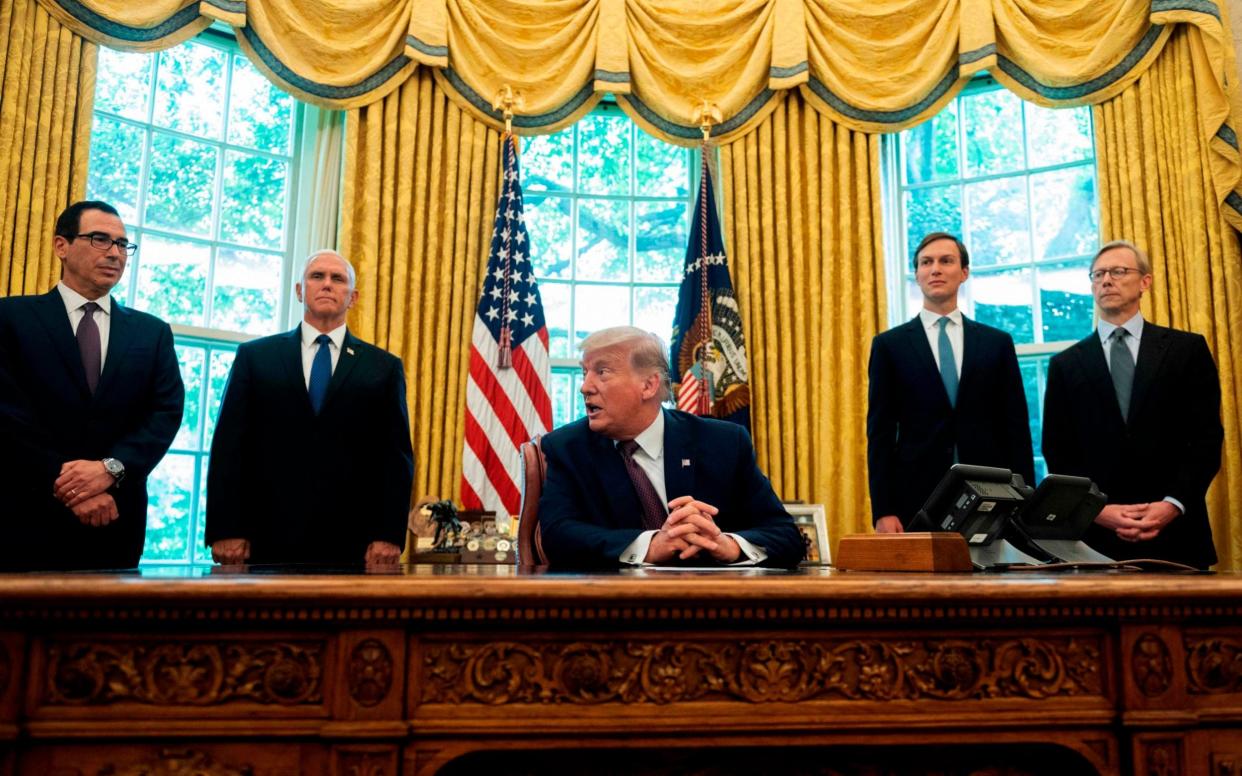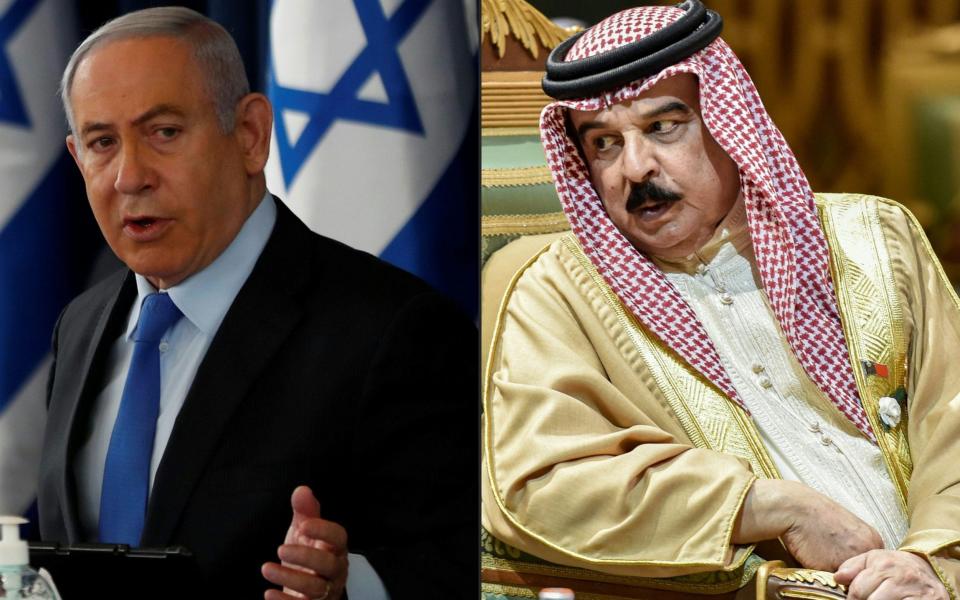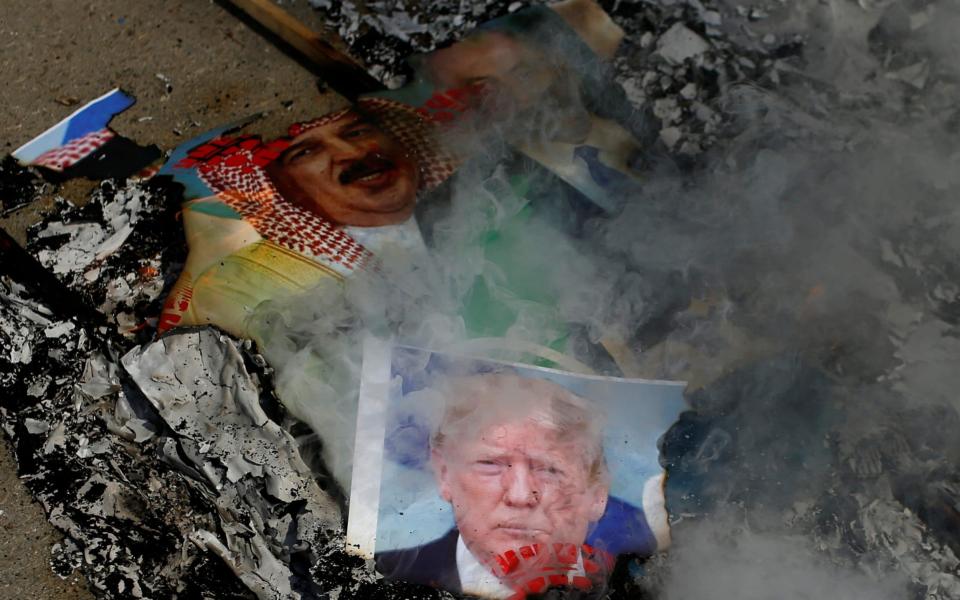The key winners and losers of Israel's peace agreements with the UAE and Bahrain

Israel, Bahrain and the United Arab Emirates will today sign peace agreements in Washington, heralding a new era of friendship between wealthy Gulf nations and the Jewish state.
Benjamin Netanyahu, the Israeli prime minister, has flown to Washington to attend the ceremony in the White House, along with his Emirati and Bahraini counterparts.
Donald Trump, the US president, who oversaw the negotiations, has hailed a “historic breakthrough” for his “great friends” in the region, which he hopes will enhance his foreign policy credentials ahead of elections in November.
But other Middle Eastern countries, notably Iran and Turkey, have strongly condemned the agreement, which they believe spells disaster for the Israeli-Palestinian conflict and could harm their own regional ambitions.
Here we look at how the so-called Abraham Accord will change the Middle East, and who will emerge from the historic deal as the key winners and losers.
Israel
Israel is likely to emerge as the biggest winner of this deal, as it will help build a US-led alliance against Iran, strengthen security ties with wealthy new allies, and potentially save the career of the country's embattled prime minister.
For starters, they unlock dozens of trade deals in aviation, tourism, and the country’s advanced tech industry, with direct flights due to start running from Tel Aviv to Abu Dhabi.
The Abraham Accords should also improve Mr Netanyahu’s reputation at home, as he faces mass protests against his leadership, a lengthy corruption trial and a severe second wave of coronavirus.
But more importantly, the prestige of securing peace with two Arab nations, following similar accords in the past with Egypt and Jordan, leaves Israel far less isolated in a hostile region.

For some time now, Israel has cooperated on security issues with Bahrain and the United Arab Emirates, but largely under the radar.
Now that security relationship can continue in public, with concerns about the growing regional influence of Iran being a key area of common ground.
In a recent interview with the Telegraph, one former Israeli diplomat predicted that the peace deal could eventually lead to a Nato-like alliance being forged against Iran.
United Arab Emirates and Bahrain
A small, oil-rich nation in the Persian Gulf, the UAE has grand ambitions of becoming a key political power in the Middle East.
This deal will lend credibility to that goal, but Emirati officials stress that they also secured a big concession from Israel in regard to the Palestinian issue.
Earlier this year, Israel had announced it would annex up to 30 per cent of the West Bank, prompting a storm of criticism from Palestinians and world leaders, including Boris Johnson.
But the UAE says it managed to convince Israel to postpone that move by several years, in return for a full diplomatic relationship and enhanced trade.

The Telegraph understands that Bahrain feels it also deserves credit for persuading Israel to postpone annexation, and that this was one of the main factors in bringing Gulf states to the negotiating table.
Iranian influence is of particular concern for Bahrain, as until 1969 the regime claimed it was part of their territory. And while Bahrain has a Sunni Muslim leadership, there are fears that the population’s Shia majority could be used as pawns by Iran to destabilise the country.
The UAE also hopes that this deal will dispel the notion that its foreign policy is controlled by Saudi Arabia, which has said it is not ready to normalise relations with Israel.
Analysts suspect, however, that the UAE sought Saudi Arabia’s permission in private before it took the bold and - in some quarters -controversial step of embracing Israel.
It also appears, now the ink on the agreement is dry, that President Trump is willing to sell advanced F-35 fighter jets to the UAE, granting them a military prowess that could rival key ally Saudi Arabia.
United States
With the US election just a few weeks away, President Trump is looking for any opportunity to present himself as a genius in foreign policy.
As the deal stands to hugely benefit Israel, it should go down well with the Republican Right and Mr Trump’s base of evangelical Christians, who regard Israel as the guardian of the Holy Land.
Last week’s joint announcement with Bahrain was the third time that the president has acted as peacemaker in the past month.
In addition to the UAE accord in August, he also secured a deal between former Balkan foes Kosovo and Serbia, who have agreed to normalise their trading relationship.
The gift of normalisation with Arab states will also deepen the president’s friendship with Mr Netanyahu, his most treasured security partner in the region, along with Saudi Arabia’s King Salman.
And if that wasn’t enough, the Abraham Accord has also led to Mr Trump being nominated for the Nobel peace prize.
The Palestinian Authority
One of the Palestinian leadership’s strongest demands is that Arab peace with Israel should only take place after the creation of an independent, Palestinian state.
By normalising ties with Israel now, both the UAE and Bahrain have upended that strategy and infuriated Mahmoud Abbas, the Palestinians’ 84-year-old leader.
The UAE’s announcement in August and the subsequent Bahraini accord last week led to protests in the West Bank and Gaza, where the UAE's flag was burned and the leaders of both states were condemned.

From the Palestinian perspective, Mr Trump’s latest deal has undermined their negotiating position in the Arab world, with the UAE and Bahrain now signalling they want to take a completely different path to securing peace.
There is already despair among Palestinians about ever securing their own state, especially after the annexation bid was announced at the start of the year.
But while its leaders knew that they were unlikely to ever win over President Trump, the perceived loss of support from the UAE and Bahrain has wounded them deeply.
For their part, both Gulf states insist that their support for the Palestinian cause remains as strong as ever, and point to the annexation delay as a key benefit for Palestinians which could only be delivered through talks with Israel.
Iran
Crippled by sanctions and a growing protest movement, Iran’s leaders must now contend with an emerging alliance of the United States, arch-enemy Israel and increasingly powerful Gulf nations.
Iran has condemned the peace accords with Israel as an act of “strategic stupidity.” The rhetoric is strong, but it has not yet been followed by retaliation against the UAE, such as severing diplomatic ties.
“Iran’s leadership has always favoured peace and not tension, particularly with its neighbours,” a senior Iranian official told Reuters news agency in August.
“We always act based on Iran’s national interests. Tehran will not take any aggressive measure as long as its interests are not endangered.”
Turkey
Recep Tayyip Erdogan, Turkey’s pugnacious president, likes to see himself as the main champion of the Palestinian cause, as reflected in his warm relationship with Ismail Haniyeh, the leader of the Hamas.
So it came as no surprise when he too condemned the UAE’s decision and threatened to recall his ambassador in Abu Dhabi.
The deal, Mr Erdogan said, was a “stab in the back” for Palestinians, adding: "The move against Palestine is not a step that can be stomached.”
Turkey’s relationship with the United States is less hostile than Iran’s, but there are severe tensions over the Nato member’s recent decision to buy Russian S-400 fighter jets.
Now, as the United States, Israel, the UAE and Bahrain grow ever closer - with Saudi Arabia possibly set to formally join that alliance in the future - the Turkish leader may be feeling isolated.
